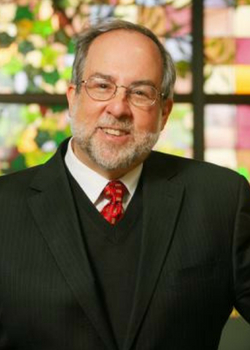Enter into the great cathedrals of Europe – St Peter’s Basilica in Rome, Notre Dame in Paris, San Marcos in Venice – what do you experience? The cathedral is a visceral presentation of a theology, a vision of the universe. Soaring vaulted ceiling, giant columns, colossal statues of saints and martyrs, luminous stained glass images of Scriptural heroes, all articulate a spirituality of contrast. We are small, insignificant, ephemeral creatures no better than insects on the floor. We are impure, corrupt, stained with sin. Who are we to approach God? God is magnificent, distant, and fearsome in judgment. In the cathedral, it is only the figure of Christ that mediates my miserable human insignificance and God's unfathomable majesty. Holiness, taught the scholar Rudolf Otto, lies in the contrast between our "utter creatureliness" and God's frightening "tremendum". Holiness is the shiver of vulnerability in the face of the infinite.
In the Hebrew, the word for "holiness" is Kedusha. This is the key term in this week's Torah reading: "Kedoshim tihyu -- You will be holy, for I the Lord your God am holy." (Leviticus 19:2)
Kedusha is the highest spiritual virtue in Judaism. It is the singular quality of God that we are commanded to imitate. For all of God’s infinity, this quality of God lies within our potential. In this one quality, we can be as God. But what it is? What is kedusha?
The conventional definition of kedusha, holiness, has to do with separateness – that which is set apart for special purposes. That which is holy is restricted. The Sabbath is Shabbat kodesh, a holy day set aside from the days of the week. Israel is am kadosh, a holy people, set apart from the nations of the world. But there is another way to look upon the very same phenomena – the obverse of the same definition. Just look at how the word kadosh or kedusha is used in Jewish life:
A family, a havurah, a circle of loved ones and friends gather at a Shabbat or holiday table to celebrate life, to share our stories, our laughter, our tears, the triumphs and failures of our lives. We raise a cup of wine and recite a prayer of sanctification. But it isn't the wine that is sacred. The prayer affirms the holiness of the circle around the table -- the bonds that hold us together as family and friends. That prayer is called Kiddush.
Two separate, independent individuals -- from different families, different cultures, even different planets, he from Mars, and she from Venus -- find wholeness in one another. They pledge to share life together. A ring is placed on a finger -- a ring whole and unbroken symbolizing lives and dreams indelibly intertwined. The tightly drawn circle of the self is unlocked to include another whose happiness becomes my happiness, and whose suffering becomes my suffering. And we recite: Haray at mi-kudeshet lee -- "With this ring, we are bonded in sanctity." This miraculous alchemy bonding two into one is called in Jewish tradition, Kiddushin.
When a loved one dies, we refuse to let the catastrophe of death be the last word. We will not sever our bonds of loyalty and love. We will not lose our memories of shared wisdom, warmth, strength, vision. We rise in synagogue -- in the midst of our people -- to recite a prayer that affirms the triumph of life over death, of hope over despair. The prayer is called Kaddish.
Kiddush, Kiddushin, Kaddish, Kadosh, Kedusha , all mean holiness, and all signify bonding -- the opening of self to embrace and hold another. Around every human being is an invisible circle, a circle of intimate concern -- the people we care for, the ones we define as ours. For some, the circumference of that circle is narrow. It includes only the individual self, its diameter reaching only to the end of the nose. For others, the circle includes family, community, and nation. For a very few, it encompasses the whole of the world. God is the infinite circle of concern. Adonai Echad, God is the circle that embraces and cares for all life. The aspiration to kedusha invites us to a life more Godly. It invites us to open and widen our circle of concern. The aspiration is rooted in the conviction that the wider our circle, the holier our life becomes. The bigger the circle, the more meaningful life becomes. Each time the tight circle of self is opened, God enters our life.
What is the opposite of holiness? At the end of Sabbath, we recite a blessing on the distinction between the holy and the ordinary --hamavdeel bein kodesh l'chol. The Hebrew word for the opposite of holy -- for the profane, the mundane, the ordinary - is Hol. Hol literally means "sand". Try and hold a handful of sand, what happens? Atomized, individuated, disconnected, unbound, the grains slip away. That's the opposite of holiness.
Just a few verses after Kedoshim tihyu in Leviticus, is the Bible’s highest moral ideal: Va’ahavt L’re’acha Kamocha. "You will love your neighbor as yourself." This the Torah’s objective, the divine dream for humanity: That we might come to realize a circle of self that is ever-growing. Every human transaction must lead to the realization of a world in which we are one, bound together in care and concern. God is one, and God invites humanity to become one. A world made one is the only cathedral God ever commanded us to build.
Shabbat Shalom!

